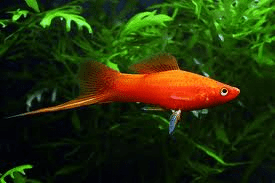
Common name: Red Swordtail
Scientific name: Xiphophorus Helleri
Average Adult Fish Size: 8cm / 3 Inches
Place of Origin: Malaysia, Singapore
Typical Tank setup: Because of its peaceful nature, the Red Swordtail is well suited for the community aquarium. However, the male Red Swordtail can demonstrate territorial aggression towards other male Swordtails so care should be taken when housing more than one male. Also, the Red Swordtail is an accomplished jumper, so be sure to provide a secure cover for the aquarium.
Recommended Minimum Aquarium Capacity: 20 gallon / 80 litre
Compatibility: Other community fish such as tetras would make a very colourful aquarium, as well as other live bearing tropical fish.
Temperature: 20-28 Deg C / 64-82 Deg F
Water chemistry: pH 7.0-8.3
Feeding: The Red Swordtail is an omnivore that will eat commercially prepared flaked foods and algae, as well as freeze-dried bloodworms, tubifex, and brine shrimp.
Sexing: Males will be much brighter and colourful at quite an early stage in their lives so it should be quickly obvious to tell the difference between the male and female.
Breeding: The Red Swordtail is a live-bearing fish related to freshwater aquarium favourites including guppies, mollies, and platys. As such, a female Red Swordtail can give birth to as many as 80 fry at one time. A spawning box is recommended, or if one is not available, provide dense floating cover to protect the Swordtail fry from potential predation by the adults. Unless it is your intention to breed Red Swordtail, the male Swordtail fry should be separated once the sex of the fry is determined. The Red Swordtail can begin breeding as young as three months of age and can quickly overpopulate an aquarium.
Additional Information: The Red Swordtail boasts exuberant coloration reminiscent of tropical flowers in bloom. Vibrant shades of red and orange are energized by an iridescent sheen, making the stunning Red Swordtail a very desirable colour variety of the Xiphophorus Helleri Swordtail.


Related Posts
Croaking Gourami – Trichopsis vittatus
Paradise Fish – Macropodus opercularis
Schubert’s Barb – Barbus Semifasciolatus